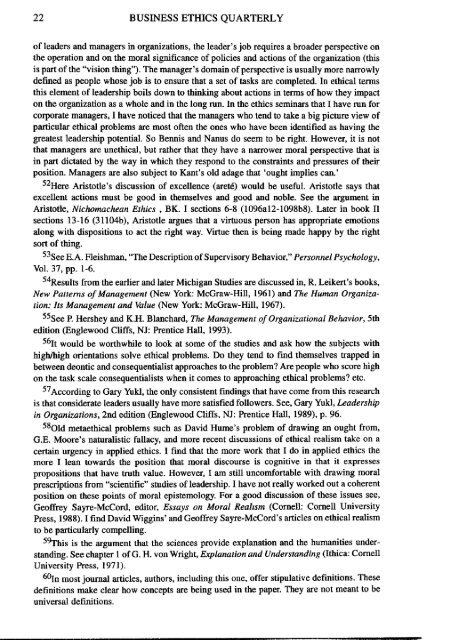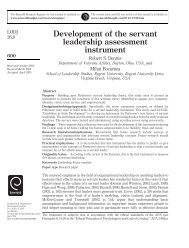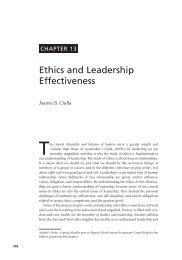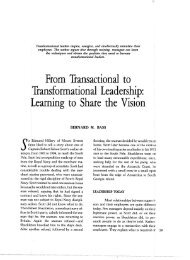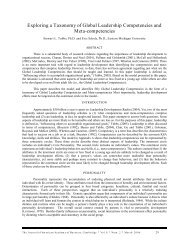LEADERSHIP ETHICS: MAPPING THE TERRITORY - Strand Theory
LEADERSHIP ETHICS: MAPPING THE TERRITORY - Strand Theory
LEADERSHIP ETHICS: MAPPING THE TERRITORY - Strand Theory
You also want an ePaper? Increase the reach of your titles
YUMPU automatically turns print PDFs into web optimized ePapers that Google loves.
22 BUSINESS <strong>ETHICS</strong> QUARTERLY<br />
of leaders and managers in organizations, the leader's job requires a broader perspective on<br />
the operation and on the moral significance of policies and actions of the organization (this<br />
is part of the "vision thing"). The manager's domain of perspective is usually more narrowly<br />
defined as people whose job is to ensure that a set of tasks are completed. In ethical terms<br />
this element of leadership boils down to thinking about actions in terms of how they impact<br />
on the organization as a whole and in the long run. In the ethics seminars that I have run for<br />
corporate managers, I have noticed that the managers who tend to take a big picture view of<br />
particular ethical problems are most often the ones who have been identified as having the<br />
greatest leadership potential. So Bennis and Nanus do seem to be right. However, it is not<br />
that managers are unethical, but rather that they have a narrower moral perspective that is<br />
in part dictated by the way in which they respond to the constraints and pressures of their<br />
position. Managers are also subject to Kant's old adage that 'ought implies can.'<br />
^^Here Aristotle's discussion of excellence (arete) would be usefiil. Aristofle says that<br />
excellent actions must be good in themselves and good and noble. See the argument in<br />
Aristotle, Nichomachean Ethics , BK. I sections 6-8 (1096al2-1098b8). Later in book II<br />
sections 13-16 (31104b), Aristotle argues that a virtuous person has appropriate emotions<br />
along with dispositions to act the right way. Virtue then is being made happy by the right<br />
sort of thing.<br />
53see E. A. Fleishman, "The Description of Supervisory Behavior," Personnel Psychology,<br />
Vol. 37, pp. 1-6.<br />
^•^Results from the earlier and later Michigan Studies are discussed in, R. Leikert's books.<br />
New Patterns of Management (New York: McGraw-Hill, 1961) and The Human Organization:<br />
Its Management and Value (New York: McGraw-Hill, 1967).<br />
^^See P. Hershey and K-H. Blanchard, The Management of Organizational Behavior, 5th<br />
edition (Englewood Cliffs, NJ: Prentice Hall, 1993).<br />
^% would be worthwhile to look at some of the studies and ask how the subjects with<br />
high/high orientations solve ethical problems. Do they tend to find themselves trapped in<br />
between deontic and consequentialist approaches to the problem? Are people who score high<br />
on the task scale consequentialists when it comes to approaching ethical problems? etc.<br />
^'According to Gary Yukl, the only consistent findings that have come from this research<br />
is that considerate leaders usually have more satisfied followers. See, Gary Yukl, Leadership<br />
in Organizations, 2nd edition (Englewood Cliffs, NJ: Prentice Hall, 1989), p. 96.<br />
^^Old metaethical problems such as David Hume's problem of drawing an ought from,<br />
G.E. Moore's naturalistic fallacy, and more recent discussions of ethical realism take on a<br />
certain urgency in applied ethics. I find that the more work that I do in applied ethics the<br />
more I lean towards the position that moral discourse is cognitive in that it expresses<br />
propositions that have truth value. However, I am still uncomfortable with drawing moral<br />
prescriptions from "scientific" studies of leadership. I have not really worked out a coherent<br />
position on these points of moral epistemology. For a good discussion of these issues see,<br />
Geoffrey Sayre-McCord, editor. Essays on Moral Realism (Cornell: Cornell University<br />
Press, 1988). I find David Wiggins' and Geof&ey Sayre-McCord's articles on ethical realism<br />
to be particularly compelling.<br />
^^his is the argument that the sciences provide explanation and the humanities understanding.<br />
See chapter 1 of G. H. von Wright, Explanation and Understanding (Ithica: Cornell<br />
University Press, 1971).<br />
^^In most journal articles, authors, including this one, offer stipulative definitions. These<br />
definitions make clear how concepts are being used in the paper. They are not meant to be<br />
universal definitions.


